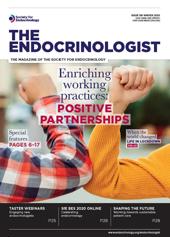Whilst the COVID-19 pandemic has taken a terrible toll, we now have the opportunity to really examine how endocrine services might be configured if we were to start ‘afresh’ and design anew.
In July, the Society set up a new working group to consider ‘The Future of Endocrinology’, co-chaired by John Newell-Price (Sheffield) and Kristien Boelaert (Birmingham). The remit is wide-ranging, with multiple partners, and includes attention to innovative models of care, remote working, patient pathways, teaching and training, research and innovation, and sharing of best practice.
There have been three streams to this work:
- COVID SECOND WAVE
COVID-19 is now having a variable impact on specialty services across the country, depending on local COVID-19 numbers, staff redeployment to general medicine, staff sickness, and the need for individuals to shield or quarantine/self-isolate. We have produced a series of recommendations to enable departments to tailor their working to their regional scenario. We see it as paramount that we continue providing specialty endocrine services in future waves for our patients’ safety. The key recommendations are:
- Endocrine departmental capacity should be left at a minimum of 25% – higher wherever possible.
- Clearly defined roles for specific team members, including nurses, shielding colleagues and registrars.
- Maintaining speciality training for endocrine trainees.
- Integrating working between primary, secondary and tertiary care as much as possible with shared systems.
- Ensuring the primary, secondary and tertiary care centres within a region understand referral routes for patients.
- Identifying patients for whom virtual consultations are appropriate long term.
- Reviewing phlebotomy services, MDTs, work load priorities and using available resources.
- RESOURCES AND TOOLS
Sharing valuable experiences is crucial. To facilitate this, we are collating people’s experiences and creating online ways to disseminate and share good ideas and good practice. Materials are to be used as templates or for inspiration, or simply to see what others have done in their particular settings to accommodate new realities. Information is being curated from the following sources:
- existing Society for Endocrinology resources
- existing external online resources
- parallel workstreams
- Society for Endocrinology Peer Review findings
- Getting it Right First Time report
- documented examples of innovative working (provided by endocrinologists)
- Society for Endocrinology-approved patient support groups
- shared pathways and protocols.
- PATHWAYS AND NETWORKS
The aim of this work is to produce a framework for a seamless patient journey, placing the patient at the centre. The framework follows the principles of right care, right time, right place. Different ways are working will be explored including:
- delivering face-to-face, virtual clinics, patient portals, primary care interfaces, patient- initiated follow up, use of digital platforms
- working with primary care to discuss how we can streamline referral process and optimise advice and guidance processes
- driving down boundaries between primary, secondary and tertiary care
- putting patients at the centre, with a focus on improved communication, safety, access to information, and patient-held records
- developing ways of sharing information amongst the endocrine community
- ensuring equity of care for all, for example for patients with rare conditions.
A great number of our members are contributing their time and expertise to this work, which will be put out for consultation shortly. Please put forward your views and help us redefine clinical endocrinology services for better, sustainable patient care. Contact us at [email protected].
Read the full recommendations







